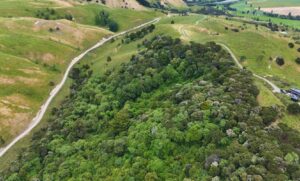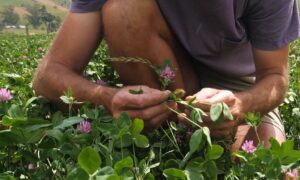Glen Eden: A Multi-Generational Success Story
Mark Guscott and his wife Susannah are enterprising people.
It should come as no surprise the son of one of Atkins Ranch’s founders has an entrepreneurial spirit. The couple and their three children live on Glen Eden in Wairarapa, New Zealand where they run a thriving farming business alongside multiple other enterprises from Dark Sky Stargazing to luxury accommodation.

The Guscotts have a deep connection to the land. Mark is the 6th generation of his family to farm Glen Eden. The Guscott connection to Glen Eden and the surrounding area goes back even further through their Maori ancestry. Mark’s great-great-great-grandfather set sail – at the ripe old age of 14 from London and was among the first European settlers in New Zealand. Upon arriving on the faraway shores of New Zealand, he soon found himself rescuing the captured daughter of a local Maori chief, who he soon married and moved with to what is now Glen Eden.
The rest, as they say, is history.
It is that deep connection to the land that drives Mark and his family’s approach to balancing production of the world’s best lamb for a market on the other side of the world, whilst doing right by the land.
It hasn’t always been that way though.
Mark points out how farming attitudes have changed through the generations. Not just here on Glen Eden, but across the country, it was only as little as two generations ago that farmers were applying a scorched earth philosophy to farming. Bulldozers took to tracts of beautiful, established native forest, to clear land for more production.
That is certainly as far from the philosophy the Guscotts are now applying to Glen Eden as you could get. Mark is implementing a regenerative farming plan, and ensuring the property is well balanced through mixed use farming. Allowing Mother Nature to recover by rotating stock, retiring land, and rebuilding native bush. There is a poetic closing of the loop to it. Marks says with a wry smile, it is almost a return to the way his great-great-grandfather would have done it. Funny how history has a habit of repeating itself…

Sitting atop the highest point of the farm is a lush tract of native bush. The bush is 50 acres and was fenced off by Mark and Susannah when they took over Glen Eden 20 years ago. The bush plays an important role in the biodiversity of the property. It doesn’t come easy though. The Guscotts have implemented a rigorous trapping and pest management program, all of which is tracked via an app to monitor predator numbers.
Mark is passionate about the health of his land. He has to be in order to produce the world’s best eating lamb. An approach he is particularly passionate about is deferred grazing. “Deferred grazing is when we leave paddocks ungrazed for a period of time” says Mark, “it lets the grass get its roots down, lets it flower, lets it drop its seed so that lets the whole pasture renew and revitalize itself for years ahead.” Fortunately Mark has a helping hand, the animals. They play a key role in trampling and eating the grass feed, starting the process over. As Mark tells us, it is beautifully simple. In theory.
Another approach, which probably relates to the Guscotts’ pioneering and entrepreneurial roots, is mixed use farming. This ensures a less intensive footprint on the land they are custodians of, whilst diversifying the interests of their business. And it is working, across the property production measures are all up, whilst stock numbers have been reducing steadily over time.

The Guscotts’ commitment to integrating environmental stewardship with productive farming at Glen Eden was formally recognized recently when they were named Regional Supreme Winners at the Greater Wellington Ballance Farm Environment Awards. In addition to this top honor, they secured category awards for Ballance Agri-Nutrients Soil and Nutrient Management, Bayleys People in Primary Sector, Hill Laboratories Agri-Science, and the Rabobank Agri-Business Management Award. Judges highlighted their successful business diversification across sheep, beef, arable, carbon, and tourism, alongside deeply ingrained sustainable practices like deferred grazing, significant environmental investments including riparian planting and a QEII-protected bush block, and strategic leadership in business operations and people management. This comprehensive recognition underscores the high operational standards and innovative, sustainable methods employed by Mark and Susannah. The awards are a testament to an intergenerational approach and a can-do Kiwi attitude that runs strong through the Guscott family.